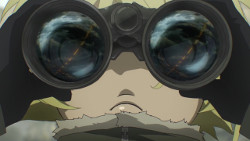 |
 |
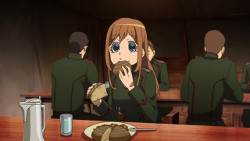 |
 |
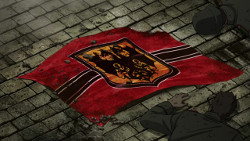 |
 |
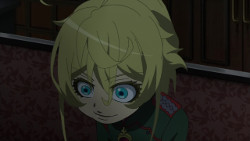 |
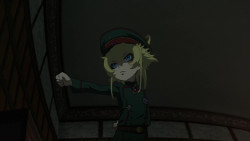 |
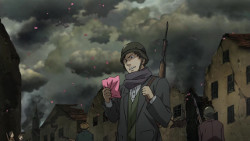 |
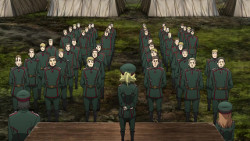 |
 |
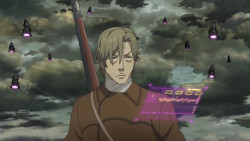 |
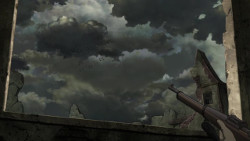 |
 |
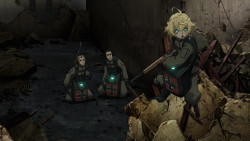 |
 |
 |
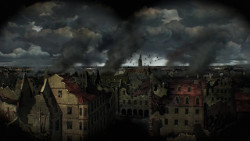 |
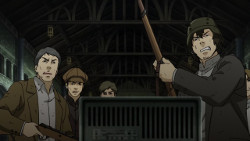 |
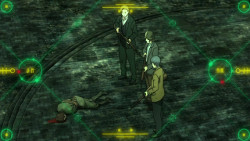 |
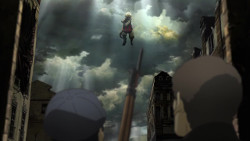 |
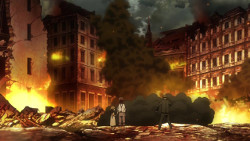 |
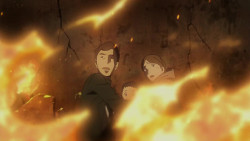 |
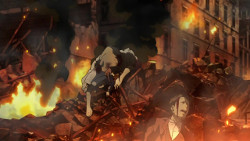 |
 |
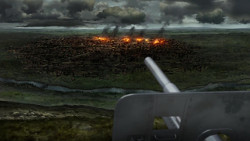 |
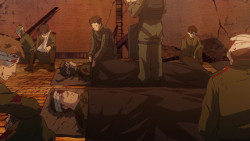 |
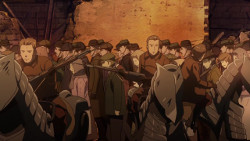 |
 |
 |
 |
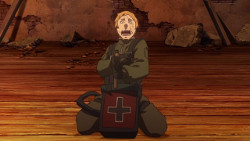 |
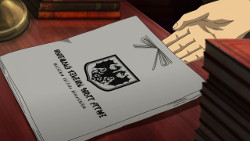 |
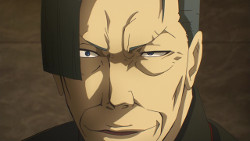 |
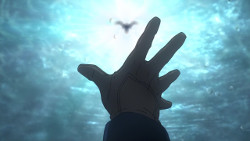 |
 |
「火の試練」 (Hi no Shiren)
“Trial by Fire”
With last week’s morbid events involving Tanya offing Aston Sue and taking his prized rifle, you would think Youjo Senki would slow down and revel in the foreshadowing. Yeah, maybe in another universe. This week took last episode’s flirt with amorality and cranked it up to 11, likely offering up Youjo Senki’s best episode to date as morality and efficiency clashed in the strongest manner possible.
The focus here this week was on that little uprising in a not-French city, where a group of partisans obtained some friendly mage support and proceeded to wreak havoc on the Empire’s logistics. In war these actions are a normal occurrence, initiated by men and women who believe the risk of certain death—partisans are usually considered non-uniformed combatants under wartime law and thus treated like spies—is worth it for impacting the enemy’s war effort. Normally partisans and occupiers try to isolate their actions from the civilian populace, but in many cases both sides become intermixed, whether due to circumstance (i.e. encircled sieges like Breslau in 1945) or deliberate action (i.e. WWII German treatment of Russian civilians) This episode is a prime example of such intermixing, where both Empire and Republic used Arene’s populace for their own purposes, collateral damage be damned.
At face value you would think Tanya—and the High Command—are to blame. After all an artillery barrage was used, Tanya diligently obeyed orders to fire on civilians, and the little loli even designed the template for transforming cities into warzones. Such thinking, however, ignores the responsibility of the partisans. The enemy made use of the city for defensive positions, dropped mages in for additional support, and did not evacuate the locals when the opportunity was given. In effect the citizenry became human shields for a strategic delaying tactic. Not all too surprising then the Empire dispensed with moral uprightness and called the bluff. Both sides bear responsibility for the resulting slaughter and continuing the cycle of hate.
What particularly intrigues me too is how well Tanya represented the nihilistic theme of this episode. We already knew what the little loli is like personality-wise, but the events here arguably illuminate it best. The city busting plan for example showcases just how invidious the little loli actually is, as it was all but designed to efficiently shorten the war for her benefit. That skipping and monologue with the commander? That wasn’t just hesitation or fear, there was excitement for seeing workplace efficiency in action. More than the facial expressions, the innuendos and small reveals this week show just how dangerous Tanya actually is when in positions of influence. As her subordinate subsequently discovered, there is no room for human decency when commanders and enemy both are willing to dispense with such formalities for the sake of victory.
The biggest surprise though of course lay at the end, where Anson Sue returned not only alive, but with the assistance of God Himself. I admit I’m a little surprised he actually did come back, but with Tanya now openly scaring her own allies—we don’t clearly know who her subordinate fired at for example—the enemy gearing up for a prolonged war of attrition, and Tanya’s name quickly disseminating amongst her opponents, I’m eagerly looking forward to what happens next—nagging concerns be damned. Something serious is about to go down, and if Zettour’s devious grin is anything to go by, it’s going to be bloody. Bloody awesome.
ED2 Sequence
 |
 |
 |
ED2: 「戦線のリアリズム」 (Sensen no Riarizumu) by Mako Niina
Preview
 |

Will we finally see Being X pay attention to another individual enough to boost him/her to take down Tanya?
Or will he continue behaving like a jilted lover and keep paying attention to Tanya hoping for him/her to finally gain “faith”?
Have you watched episode 6 like at all? Being X straight up said, how does it feel with the whole world against you, blasphemer? Like do you and others pay attention to whats shown or just ignore it and just complain about Tanya being OP?
You’re helping my point. Everything Being X does is for Tanya 🙂
Being X does not care about the dead of the war or the war. Hell, for all we know, he could have influenced the Entente new government to march into the Empire. He set this all up remember?
Personally I find it hard to sympathize with the Republic as they are the invaders in this scenario and the city was taken in a counter-invasion.
Despite the ruthlessness of the Empire, they did give the enemy the opportunity to evacuate and then surrender. The Republic getting shocked that the Empire is willing to raze an Enemy City after they chose to use it as a battleground, the partisans blowing up the railway tracks means that the city has no longer any strategic value.
War is hell, there is no denying that fact, no matter the age, culture or world where war presents itself. That being said, The Empire has been fighting a defensive war for some time now, this fact has been confirmed by all parties involved in the conflict so the Empire is the victim here, no matter how much they try to sugar cotted it the Republic and its allies are the bad guys of the story. But becuase war knows nothing of sides or ideals this masscre had to happen: Arene´s militia and the Republic used their own inocent civilians as a human shield and The Empire used some dirty legal trick to turn the city into ash; no heroes here, no roght or wrong, only death reings supreme, now ladies and getlemen, that is war. People who go to war must be insane, I see no justification for this insanity.
What horrifies me is that Tanya is using knowledge from our World War II to advance legal warfare in that fantasy world, How? In WWI the civilian caualties were of arounf 5% but WWII went up to 50% thanks to dirty tricks like that legal manuever Tanya just pulled and the Holocaust. The way things are going the First World War in that setting is going to be much more bloody than ours, take a minute to think about that.
When your entire strategy is predicated on your opponent being the better person and following laws that you openly flout, do not be overly surprised when it fails completely. While I know that the countries are likely manipulated by Being X, what we are seeing on screen is the fall of the Age of Romanticism. No more moral high grounds, no more chivalry on the battlefield, no more honorable compromises; it indeed is the First World War. The Empire can make the case that they have done everything within the bounds of international law and even human decency without sacrificing their military objectives. The common citizens were allowed to evacuate and if the partisans kept them there then the responsibility falls onto them.
The interesting thing to me is Tanya authoring a paper about Urban Warfare. I believe that she understood the kind of quagmires they are, learning from the infamous sieges in Stalingrad and Leningrad. Tanya would want to have no part in it and would advocate just shelling the cities flat. In the end it would be less costly to the Empire if it were an occupied foreign city. The Empire’s achilles heel is manpower, tying up entire army groups in siege warfare would be a critical error on their part.
And yes, I too think it is highly likely that Tanya just shot her own man. He has been in frame every so often but only now we learn his name. She fiddled with his weapon before returning it to him so there is every chance she took out the firing pin.
BLAMed for dereliction of Duty. Yeah I can see Tanya doing that as hesitation is inefficient and inefficient parts are removed.
I see him shooting himself. He was given a hard course of action. either one damming. No way out except being dead.
Considering how urban combat is a meat grinder for the attacker, the most efficient away is to
surround the objective and flatten it. Even with care you are going to wreck enormous damage, so why not be efficient at it?
Often did not work well the enemy hid out in bunkers and basements and you just ended up with the same problems in the ruins after wasting time and shells. Stalingrad was bombed to hell and still stayed a hell. Here though it a partisan force that has not had the time to dig in so flattening can work.
As RedRocket mentions, flattening a city can make things worse. Stalingrad is the obvious example, but there’s also Monte Cassino and Ortona. If you want to occupy a city against a determined defender, it will be costly one way or another.
Show Spoiler ▼
But given the anime context of Anson being the only person to have fought and encountered Tanya twice and lived to tell about it, it make sense for him to be set-up as a major opponent.
This episode most directly invokes the “Rape of Belgium” by the German army in the opening days of WWI. The name “Arene City” reminded me of Andenne.
Yes and what war crimes were actually committed is still a argued point the German side stating civilian casualties caused by the German’s shelling resistance fighters positions the fault of the resistance. It is very clear that the allied side greatly exaggerated what happened. When the British are willing to put arms and ammunition on the civilian ocean liner Lusitania and then blame the Germans for sinking a legitimate target claiming there was no arms and ammunition on board anything from the Allied side has to be questioned. Not saying the Germans did not commit war crimes but my limited study shows this issue is complex and both sides have reasons to lie. Certainly the low level rape and murder was done as war is great cover for the criminal mind interested in that behavior. One way to judge if it was the fault of command is how much they try to prosecute their own troops when caught. One factor commanders must know is you will have troops committing atrocities because they were inclined to do so even before joining the army so you must be prepared to catch them and stomp on any natural coverups that members of the same group often do for fellow members.
It’s likely, although the Rape of Belgium noticeably occurred in areas peacefully occupied, which is where a lot of the outrage sprang from. The killing this week transpired in a war zone in all but name, so it’s harder pinning the blame solely on the Empire.
I’m not sure “peacefully occupied” is the most accurate description, but the worst of the Rape of Belgium incidents were reprisals against innocent civilians and property in areas occupied by the Germans, and as you say that really isn’t what’s depicted here. I wonder whether the incidents were modified to give them a more Japanese perspective. I suspect a lot of Japanese think of the WWII bombing of their cities as a war crime, and what’s depicted in this episode is similar to that.
I’m actually surprised to hear Ansom Sue being brought back.
I thought the last episode certainly laid a foundation for it (injured man falls into freezing water, slowing down vital functions and surviving long enough for resuce), but didn’t think they would actually use it.
And I guess they didn’t, if Mysterious Being X brought him back.
I thought about the freezing water actually helping as well. But clearly Being X was talking and probably using the freezing water as cover for direct divine intervention. Being X is clearly using the don’t make it clear there is a god rule in order to achieve the desired faith without proof result. After all X could make it clear to all there is a god if X so wished.
Well, Being X could have just known he’d survive and talked him through it. But the end result is the same either way, so…
I’m guessing he was brought back because the show needs some form of end boss and bringing Anson back is easier and faster than introducing a new character. Plus also lets the audience see just how committed God is to spanking Tanya.
I learned at the US Army Infantry School during basic and advanced officer courses that the laws of war that work, and traditionally agreed to in international agreements, are those that benefit both sides. In example after WWI the use of poison gas was banned and although all side had chemical weapons in WWII no one used them. Reason the agreement worked was all sides realized chemical weapons inflicted fairly low casualties on prepared troops while slowing military operations in the area way down. Good treatment of prisoners causes other side to surrender faster, unfortunately the Japanese believed we would treat them the same way they treated prisoners. Marking minefields and the other rules of the older mine treaty are agreed to be followed by the major military powers of US, Russia and China. The major military powers who actually think they could be in a conventional war again and do not want to lose them have not agreed to the new mine ban treaty after all the problems with unmarked mines was illegal under the old treaty and US doctrine requires all non commend detonated, non line of defense mines be marked and mapped except for clearly visible air and artillery dropped mines that are not concealed. A doctrine we believe Russia and China share where mines are used to deny a area to a enemy and not intended as a killing element of your defense and the marking and mapping allows your forces to move without fear of your own mines, the mapping allowing quick removal of a mine field that you now want to maneuver on.
Otherwise Tanya’s rules are basically what the US Army follows at least up to my service and it seams the same policy continues in the current conflict. I was taught that the defender must be the responsible party for civilian deaths and it is the defenders job to remove civilians from areas that their forces are in. Primary reason as stated in review, civilians cannot be used to deny the enemy of ability to take military objectives. So it hard to see Tanya as evil for policies I support. Except maybe at the end if she was trying to manipulate a early artillery strike as enemy was leaving but that may be the enemies fault as well. I will state thought that war itself is evil, maybe a necessary evil, but still evil just because it is necessary does not remove it’s evil and must always be thought of in regret.
The problem is when you have irregulars operating and they do not abide by the rules of warfare. And normally they do not. It is good practice morally to treat partisans by the same rules, but that is a tough sell to troops in field.
Wait….does this mean that if the US just took the time to order evacuation warnings in Afghanistan and Iraq, we would have had the freedom to carpet bomb cities to the ground, with no repercussions?
(Not being sarcastic. I’m genuinely curious if the US military has overlooked a tactic.)
Typically under international agreement no. Following President Johnson’s Vietnam bombing campaign, the Geneva Convention was modified to prohibit indiscriminate destruction of all civilian structures, even if located beside military targets. Of course this also requires defending forces to ensure the evacuation of all nearby civilians, but that can be difficult when fighting, and this amendment is often ignored when one side sees an advantage–see the recent evacuation of Aleppo, or the Gaza Strip rocket strikes.
The US had the moral high ground following 9/11 so breaking the Geneva Convention would have hurt their image internationally, plus the Bush administration had the bright idea to try and rebuild Afghanistan and Iraq as democracies. Mass bombing doesn’t particularly endear an occupied population to such desires.
That’s why I’m asking for more clarification from RedRocket.
It sounds like he’s saying that the Defenders are the ones who are supposed to be held responsible for civilian lives, so long as sufficient warning is given. If so, doesn’t that suggest that the US could have held onto the moral high ground, even with carpet-bombing?
To clarify line of defense mines I primarily am referring to Claymore mines which are indirectly marked by the fact that fighting positions are nearby and Claymores are normally command detonated. A lot of the mine attacks on US forces in Iraq did not violate the old mine treaty as they were command detonated, but the operator of those mines if not in uniform is a unlawful combatant that is subject to being shot under the old rules and are not given Geneva accord rights by the US.
Improvised Explosive Device popular as a buzz word was mainly used by the Government to first minimize the danger and then claim they were a new unknown how to handle threat when they are simply improvised mines that I learned to make in US Infantry training in the 80’s and called mines. Improvised mines go back to the invention of gunpowder. Also most of the mines that cause casualties to US forces in Iraq and Afghanistan are the made in a factory standard mines often shaped charge anti tank mines there is nothing improvised about them.
Primary way to deal with mines is movement on foot with engineer anti mine sweeping but the US failed to get anywhere close to the US doctrine required 500,000 plus troops needed in either country, attempting to move in vehicles to make up for manpowered shortage causes most of the casualties. The countries require roughly the same amount of troops even with Iraq having a much greater population because of Afghanistans mountains.
Still forgetting a point.
The Artillery has not yet adjusted to mages like it did to counter battery fire and aircraft in the wars. The Artillery will start to be scattered out more widely and will be camouflaged.
For that to happen you need a communications network (telephone and wireless) , which they have and leaders who will institute it. Even better, SPGs! Artillery was supposed to be the primary weapon of WWI, but the mages took over that.
I will submit from a military point of view, what the Empire did in response to the Arlene uprising was a good thing for them. If you review of partisan warfare in Russia during WWII, you’ll find out it was a nightmare for the Germans to maintain rear area security outside of the major cities and supply centers and tied down lar numbers (albeit second tier) troops to ensure order.
What the Empire did ensures that a general rear area revolt is not something the Republic will use as a strategy.
This reminds me of a SF story where Gandhi tried to use the same non-violent uprising strategy against the Germans when they took over India from the British in WWII. Needless to say it did not end well for Gandhi or Nehru.
I’d also think the thing that truly damned the partisans was the killing of that escaping prisoner in full view of Tanya. If anything, that one act was all the justification needed because it made the partisans appear to look like the type of people who don’t care at all about prisoners or civilians.
That probably was the justification alongside the evacuation order. The Empire had the legal right throughout with their precautions, although flattening a partisan-occupied city still doesn’t look good to others. The scale of response is as important as the manner of response a lot of the time.
I also think the partisans destroying the railway bridge also gave the empire one less reason to retake the city intact. As they’re going to have to reroute the supply line now regardless, better to destroy an enemy base and let him deal with the refugees, than to leave it intact as a springboard for further attacks.
I wonder if the comedy aspect has packed up and left? There was always plenty of darkness splashed around, but with the new battalion they could still get joke-y and hot blooded and so on. With the 203rd having a string of easy victories, it started to feel like Catch-22 up in here.
Harder to do that when you have a couple of legitimate war crimes under your belt.
Warning was given to evacuate and they didn’t take it. In that regard, the Empire’s actions was for more legally defensible than the Waffen SS at the Warsaw Uprising.
“Well, we told them to leave! Time to drop the bombs and reduce the city to rubble.”
I mean, when you’re murdering hundreds of defenseless people, I still call that a war crime. Even if the Nazis went further.
Both sides bear blame here. The Empire certainly could have acted better regarding the reconquest of the city, but the partisans also blatantly shot unarmed prisoners. Plenty of war crimes to go around this week.
So I guess the lesson of the week is: Decency is a luxury, suited only for times of abundance and peace. In times of strife and scarcity, it is cold pragmatism that prevails…
That is such a ZEN answer 🙂
Zing!
https://randomc.net/image/Youjo%20Senki/Youjo%20Senki%20-%2008%20-%20Large%2025.jpg
War is hell. There’s nothing glorious in it except death, misery and suffering.
https://randomc.net/image/Youjo%20Senki/Youjo%20Senki%20-%2008%20-%20Large%2026.jpg
Back to the episode.
If the previous one deals with the ascendancy of the Mage Corps to more than spotting and reconnaissance, this week deals with war crimes and Geneva Convention, its understanding and ratification and also the war itself degenerating to a total war.
Someone correct me if a similar ruling is in place in the Geneva Convention i.e. if a city has been designated a battle zone, all those remaining in the city are considered as hostile forces?
The other factor here is how the not-Geneva Convention is understood and ratified. I do believe that Tanya’s paper is based on the ruling stated in the not-Geneva Convention albeit the succeeding clauses and articles have been interpreted and ratified that thoroughly legalises the use of excessive force to root out the enemy in the city. From the not-German Oberkommando, the revised understanding and ratification of the not-Geneva Convention is perfectly in line and legal as per what was written in the not-Geneva Convention. Although, the other nations will see what not-Germany doing as a form of war crime and escalation to a war against humanity. It will not be surprising that the war in Youjo Senki degenerates into total war of extreme proportions.
The other thing that we see is the infant steps to the conflict degenerating into a total war. The inclusion of the populace and the their refusal and/or denial of evacuation got them trapped in the town itself. And when the fighting started, all hell breaks loose.
Though Pancakes, I’m rather surprised that you did not screen cap the shot where the camera was focusing on the statue of the dancing children that’s in the town square. Aside from the shots of destruction, hate, vengeance and combat stress, that shot, the one with the children statues dancing around a crocodile, deserves to be put up and it is a direct reference to Stalingrad and also a huge indicator of how bad things will turn for all sides.
i just love veronica’s munching breads and food, it’s my fav’ part of the episode. she makes awsome and funny faces when she eats her bread, vero-chan rules.
tanya x veronica best tag team ever.
she got cute eyes.
https://randomc.net/image/Youjo%20Senki/Youjo%20Senki%20-%2008%20-%20Large%2003.jpg
I wonder if there is more than one god in this world becuase Tanya has done evil in this world than in her previous life. It could be that the gods are fighting each other using the humans as their chess pieces.
That would make a lot of sense.